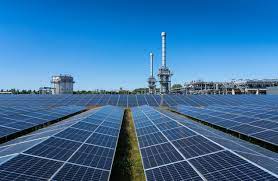Choosing the Right Solar Panel System Size for Your Home

As the demand for sustainable and renewable energy solutions continues to grow, many homeowners are considering the installation of solar panels to harness the power of the sun. One critical aspect of this process is determining the right solar panel system size for your home. Selecting the optimal size involves a careful consideration of factors such as energy needs, available roof space, and budget. In this blog, we will discuss the key steps and considerations to help you choose the right solar panel system size for your daily energy requirements.
Know Your Energy Needs
The first step in selecting the right home solar panel system size understands your household’s energy consumption. Check your electricity bills to identify your monthly and annual energy usage. Consider seasonal variations and any upcoming changes in your energy needs, such as the addition of energy-intensive appliances or an electric vehicle.
A home energy audit can provide valuable insights into areas where you can improve energy efficiency. Upgrading to energy-efficient appliances and making your home more energy-efficient can impact the overall size of the solar panel system you require.
Determining Available Roof Space
The amount of available roof space is a critical factor in determining the size of your solar panel system. Assess the orientation, tilt, and shading of your roof, as these factors influence the efficiency of solar panels. A south-facing roof with minimal shading is ideal, but modern solar technology allows for installations on roofs with various orientations.
Measure the available roof space and consider any obstructions, such as chimneys or vents, that might limit the placement of solar panels. While solar panels are designed to be compact and space-efficient, it’s essential to ensure that your chosen system size fits comfortably on your roof.
Calculating Solar Panel System Size
Solar panel system sizes are typically measured in kilowatts (kW) or megawatts (MW). The size you choose will depend on the energy needs you identified in the first step. A common rule of thumb is that 1 kW of solar panels can produce about 1,500 to 2,000 kilowatt-hours (kWh) of electricity per year, depending on factors such as location and weather conditions.
To calculate the ideal system size, divide your annual energy consumption (in kWh) by the average annual production per kW. Keep in mind that local weather patterns, sunlight hours, and potential shading should be factored into this calculation for accuracy.
Consideration for Future Changes
When choosing the right solar panel system size, it’s essential to consider any changes in your energy needs in the future. If you plan to add more energy-intensive appliances, an electric vehicle, or if your household size is expected to increase, you may need a larger solar panel system to accommodate these changes.
Conversely, if you invest in energy-efficient upgrades or plan to reduce your energy consumption, you might be able to install a smaller system. Flexibility in system size is crucial to ensure that your solar panel installation remains efficient and cost-effective over the long term.
Budget Considerations
While solar energy is an excellent long-term investment, budget considerations play a significant role in determining the size of your solar panel system. The upfront cost of solar panel installations can vary based on factors such as system size, equipment quality, and installation complexity.
Explore different financing options, including solar loans, leases, and power purchase agreements, to determine the most cost-effective solution for your financial situation. Some jurisdictions also offer incentives, tax credits, or rebates that can help offset the initial costs of solar panel installations.
Consulting with a Professional Solar Installer
Determining the right solar panel system size involves complex calculations and considerations. Consulting with a professional solar installer is highly recommended to ensure accuracy and efficiency in the sizing process. Experienced installers can conduct on-site evaluations, assess your energy needs, and provide tailored recommendations based on local conditions and regulations.
Professional solar panel installer like Isolux Solar, also stay abreast of the latest advancements in solar technology, helping you select the most efficient and cost-effective system for your home. Additionally, they can assist with the permitting process, ensuring that your solar panel installation complies with local building codes and regulations.
Conclusion
Choosing the right solar panel system size for your home is a crucial decision that requires a careful evaluation of your energy needs, available roof space, and budget considerations. By understanding your household’s energy consumption patterns, considering future changes, and consulting with a professional installer, you can make an informed decision that not only meets your current needs but also positions your home for a sustainable and energy-efficient future. Investing the time and effort to choose the right system size will maximize the benefits of your solar panel installation and contribute to a cleaner, greener planet.





